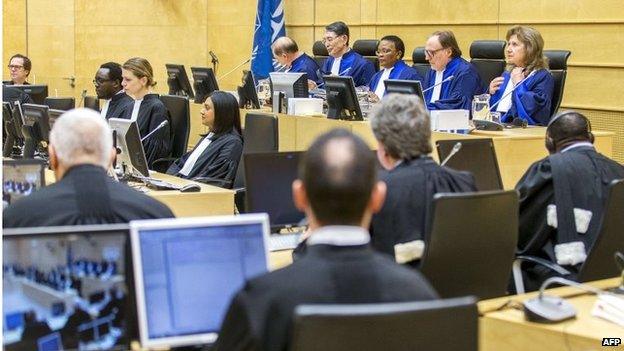Israel election: Netanyahu win dims peace process prospects
- Published

Benjamin Netanyahu appealed to right-wing voters opposed to the prospect of a Palestinian state
The outside world tends to look at Israeli politics through the prism of the peace process with the Palestinians.
But over the course of a long election campaign the issue did not appear to have a high profile.
The judgement of most candidates seemed to be that Israeli voters were preoccupied with cost-of-living issues.
The ruinous expense of buying or renting a home is at the top of the national agenda, especially for the young.
When it comes to what to do about the Palestinian question, differences among the parties in blocs on the right or left are actually rather small, so to steal votes from others in the same camp required focusing their campaigns on other matters.
'No state'
Everyone knows, of course, that the Israeli right, led by Benjamin Netanyahu, is at best sceptical about the prospect of a peace deal with the Palestinians, while the left under Yitzhak Herzog is much keener on the kind of constructive engagement that would keep the White House and the State Department happy.
For long weeks the candidates appeared content to allow the voters to draw their conclusions on the basis of those underlying assumptions.

Mr Netanyahu says the rise of militant Islam makes a Palestinian state dangerous for Israel
But Mr Netanyahu's campaign managers seem to have been rattled by opinion polls which seemed to show him trailing as election day loomed.
It was in that context that he chose to play the Palestinian card, as it were.
He made it clear that in the modern Middle East with its rising tide of militant Islamism and its deepening atmosphere of instability the conditions just do not exist to create a Palestinian state.
It was a smart move invoking the image of a leader who is prepared to stand up for Israel's interests in an uncertain world and who is not worried if his single-mindedness on the issue irritates the Europeans, the Americans or indeed anyone else.
At one point he was asked directly if his return as prime minister would mean categorically that a Palestinian state would not be established.
He answered with the single Hebrew word "Achen" - which means "indeed".
Palestinian strategy
For the Palestinians, Mr Netanyahu's electoral triumph leaves them pondering their courses of action.

The Palestinians have sought to increase pressure on Israel by turning to international bodies
The Palestinian Authority has already played what it regards as one of its strongest diplomatic cards against Israel.
At the start of this year, it opened proceedings at the International Criminal Court, hoping to internationalise its dispute with Israel and turn it into a kind of war of laws.
The problem is that this strategy leaves them without an obvious move to make in response to Mr Netanyahu's decision to effectively campaign for a mandate on a promise to block the creation of a Palestinian state.
They may be frustrated and dismayed by the outcome, but in the short-term at least it is hard to see what they can do about it apart from doubling down on their strategy of joining international agencies and using membership to advance their case.
Off agenda
Mr Netanyahu is a smart political operator, of course, and if he serves out the full length of his new mandate as prime minister he will overtake David Ben-Gurion as the longest-serving leader in the history of the state.
So it could be argued that he is ruling out the creation of a Palestinian state in the circumstances that prevail in the Middle East at the moment and that somehow he has left open the possibility that his attitude might be altered if those circumstances were to change profoundly.
There are lots of diplomats in the United States and elsewhere who have built up extraordinary expertise in the peace process over many long and unsuccessful years of trying to make it work.

A right-wing coalition would oppose ceding land
Among them there will be some who will be seeking any grounds for optimism they can extract from Mr Netanyahu's gnomic use of that single word "Achen".
But his followers in Likud will favour a much simpler interpretation - that at the height of a difficult campaign Mr Netanyahu went back to basics and rallied the Israeli right by articulating their lack of enthusiasm for the two-state solution.
When he argues that the time is not right in the turbulent circumstances of the moment for the world to dream of implementing a two-state solution, those supporters are probably hoping that he is making the issue go away.
Those Western diplomats who specialise in the issue will not give up hope, of course, but the tone of this Israeli election campaign and the manner in which Mr Netanyahu sealed his victory mean that the prospects could hardly be bleaker.
- Published18 March 2015

- Published17 March 2015

- Published18 March 2015
